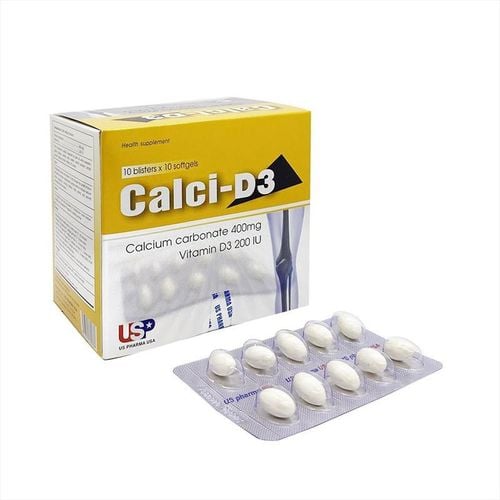The calcium needs of teenagers are higher than those of adults because, at this stage, they require a large amount of the mineral to build strong bones and achieve optimal height growth. So, how much calcium do teenagers need?
1. The role of Calcium for teenagers
Calcium is a mineral that plays a key role in bone formation, with 99% of the body's calcium concentrated in the bones, and the remainder involved in muscle and nerve signaling. Calcium is particularly important during puberty, a stage marked by rapid physical and mental development. Adequate calcium intake helps ensure strong, flexible bones and supports optimal height growth. Additionally, building a solid bone framework during this period can help reduce the risk of osteoporosis later in life.
2. How much calcium do teenagers need daily?
One common question parents have is how much calcium teenagers need daily, especially to optimize their nutrition and promote height growth. According to the World Health Organization (WHO), the recommended calcium intake for teenagers is between 1000 mg and 1200 mg per day. This is higher than the adult requirement, almost equivalent to the needs of pregnant and breastfeeding women. Calcium needs during this period are quite high, so it’s important to meet these needs through a nutritious diet. Ideally, calcium should be obtained primarily through food, with daily consumption of calcium-rich foods, rather than relying on supplements.
3. Common mistakes in Calcium supplementation for teenagers
Many parents believe that simply providing calcium supplements can help their children grow taller, often leading to the misuse of such products. Here are some common mistakes in calcium supplementation for teenagers:
- Over-supplementing Calcium
Excess calcium in a teenager’s body can lead to bone ossification, preventing bones from growing longer. This can hinder the child from achieving optimal adult height. Long-term use of high-dose calcium supplements may increase blood calcium levels, causing fatigue, depression, nausea, vomiting, and diarrhea. In severe cases, it can lead to heart rhythm disturbances, low blood pressure, kidney stones, and kidney pain. Though rare, calcium overdose can also interfere with the absorption of essential nutrients like iron and zinc, potentially leading to poor health, stunted growth, and frailty in children. - Calcium Supplementation Without Vitamin D
Without accompanying vitamin D supplementation, the amount of calcium effectively absorbed by the body remains limited. - Neglecting Other Supporting Factors
Calcium's integration into bones depends on various other factors, such as vitamin K2. Therefore, ignoring this vitamin may result in bones that are not as strong as they should be. Additionally, factors like genetics, physical activity, and regular exercise are equally vital for bone strength and height growth.
4. Safe measures for Calcium supplementation in teenagers
During puberty, teenagers require adequate amounts of calcium and other essential nutrients. However, improper supplementation methods may bring more risks than benefits to their health. To safely provide calcium for teenagers, consider the following measures:
Supplement with Foods
Calcium in food often exists in the form of calcium salts, and the body absorbs the elemental calcium needed for bone formation. Calcium from food sources is more bioavailable, better absorbed, and safer compared to calcium supplements. Calcium from foods such as various types of milk, cheese, yogurt, shrimp, crab, fish, and meat. Some other calcium-rich foods for teenagers from plant-based sources include dark green vegetables, fresh fruits, legumes, nuts, and seaweed. These natural food sources provide calcium in a form that is safe and helps maintain a balanced calcium level in the body.
Therefore, the best way to supplement calcium is through diet, unless the child does not consume enough or shows signs of calcium deficiency, in which case calcium supplements for teenagers should be considered.
Calcium supplementation should be part of a diverse diet
Diet and nutrition play an important role in improving a child's height. A balanced diet rich in calcium, phosphorus, vitamin D, vitamin K2, zinc, iodine, and magnesium is crucial for determining a child's height growth.
Drinking Milk Regularly
Milk and dairy products are relatively high in calcium. A standard liter of cow's milk contains about 600-700 mg of calcium. Therefore, if there are no issues with cow's milk protein allergies, teenagers should drink 300-500 ml of fresh milk or dairy products daily to supplement calcium for growth. However, it is important to choose milk that is rich in other nutrients such as magnesium, zinc, and vitamin D3, which help with calcium absorption, ensuring strong and healthy bones. If the child cannot consume cow's milk, alternative options like nut milk or soy milk can be used.
Combine with Physical Exercise
While nutrition is a very important factor, other aspects like physical activity should not be overlooked. Encouraging children to engage in outdoor sports activities increases vitamin D absorption, which will help them reach their maximum height when they grow up. Sports like swimming, basketball, cycling, and running are particularly beneficial for children.
Physical exercise not only helps children optimize their height development but also reduces the risk of overweight and obesity, while promoting better overall health and physical resilience.
Calcium supplements for teenagers
Calcium supplements for teenagers are recommended when their daily diet does not provide enough calcium, when they have a calcium deficiency, or when they are suffering from certain bone conditions such as rickets or osteomalacia. So, when should calcium supplements be considered for teenagers?
- Calcium deficiency in teenagers with symptoms such as: restlessness, difficulty sleeping, poor sleep quality, excessive sweating at night, bone deformities like flat head, prominent forehead, bowed legs, knock knees, delayed growth in height, and bone pain, particularly at night.
- Children who refuse to eat dairy products, seafood, or vegetables.
- Teenagers who are overweight or obese.
5. Important considerations when supplementing calcium for teenagers
To properly supplement calcium for teenagers, parents should pay attention to the following issues:
- The best time for the body to absorb calcium is in the morning, so parents should give their children calcium after eating, about 1 hour later.
- After taking calcium, children should go outside to get some sunlight to enhance the absorption of calcium in the body.
- Calcium should not be taken at night or on an empty stomach, as this can cause calcium to accumulate in the body, potentially leading to fatigue, difficulty sleeping, and an increased risk of urinary tract stones.
- Should not supplement Calcium for a long time; it should only be used for a period of time, and the focus should be on a balanced diet for the child.
- Avoid taking calcium at the same time as drinking milk, coffee, or fruit juices to prevent interference with calcium absorption.
- Ensure safety for the child, the use of calcium supplements for teenagers should be guided by a doctor.
Hopefully, through this article, you now know how much calcium teenagers need daily and the most effective and safest ways to supplement calcium for their growth.
To arrange an appointment, please call HOTLINE or make your reservation directly HERE. You may also download the MyVinmec app to schedule appointments faster and manage your reservations more conveniently.













